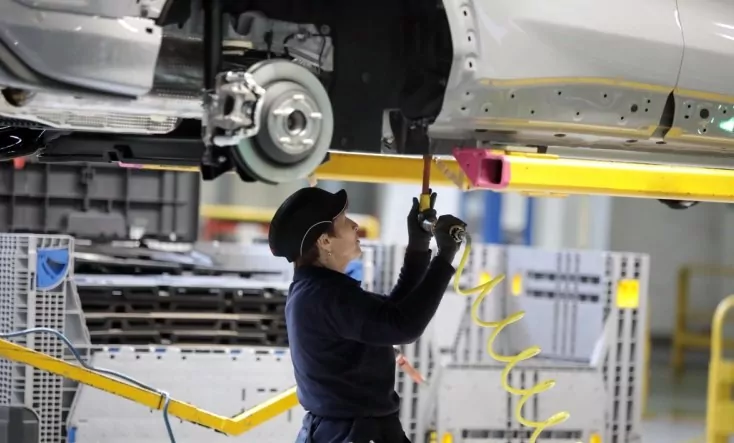The year 2021 was a very good year in terms of development plans for western companies. In the summer alone, investments for the next few years exceeding one billion euros were announced, which will make the region an even more important hub than it is today in the IT&C and automotive sectors. But the general instability of the last six months in so many areas of interest now calls for much more caution. Three major challenges will mark 2022: the labor crisis, which will hamper expansion and development plans, supply chain problems, and energy prices that no longer offer any predictability.
Urmărește mai jos producțiile video ale Economedia:
- articolul continuă mai jos -
“The labor supply problem is a global one, but in Romania, it is already becoming far too acute lately. Companies’ development plans are sometimes far too ambitious, and by the time they get around to recruiting they will find that many difficulties arise. Labor costs have risen a lot here, the selection pool is getting smaller and there is competition with surrounding countries, which are also starting to develop in the IT&C and engineering area. A company that has, say, one work point in Romania and two in neighboring countries is now more tempted to redistribute its development plans to places where it can find people more easily. In addition to the investments already announced, there are others in the pipeline. Companies are making calculations and will most likely announce in the second quarter of next year where they are going,” says Florin Drăgan, rector of Politehnica University of Timisoara.
Another human resource challenge is retaining current IT&C employees. Foreign companies have already started recruiting people to work directly for them from Romania, and this will exacerbate the problems. The same phenomenon is also seen internally: companies headquartered in Bucharest or other big cities are hiring people from other regions without having to relocate them. Universities in Romania cannot produce as many specialists as the market needs, so retaining existing specialists is paramount.
“The coronavirus pandemic has completely changed the way we work. Employees now want to work from home, even if some companies want to bring them to the office one or two days a week to maintain the organizational culture. In Western Europe, by contrast, working from home was common even before the pandemic, so they are much more open to this benefit for employees. Most likely, some of our IT&C people will stay exclusively at home, precisely because companies don’t want to lose them. This has a big impact on the office market, which has been in a holding pattern for two years. Some projects have been abandoned and others are in slow progress”, continued Florin Drăgan, rector of the Politehnica University of Timisoara.
Supply problems will persist in automotive or telecom
There are currently many delays in the supply chain of companies in the automotive or telecommunications area. The impact is significant, predictions have to be made to electronic component factories about what they will need in nine months’ time, for example, but this has become very complicated because of the instability in the market. Telecom operators or automotive customers cannot plan for the long term at the moment. The global microchip crisis is set to worsen, and company representatives in the West fear that the situation will become problematic in Romania as well. The cryptocurrency market also plays an important role in this situation.
“There is a lot of mining, and that means high energy consumption and an increased number of electronic boards. When there is a huge demand from this area, the market is affected and the supply of material is slower. There is also a major problem with ancillary equipment such as laptops: delivery times here have also increased dramatically, between three and six months, even nine months for some of the more niche equipment, here we are talking about the semiconductor crisis because of the pandemic. We are involved in projects such as IPCEI Microelectronics through PNRR, but this may solve some problems in the future, not in 2022. Also, the coronavirus pandemic has meant that there is much less work on the stock in the automotive sector. Sales of many car manufacturers have dropped, so the main suppliers have cut back production to avoid being left with unsold goods,” says Rector Florin Dragan.
From a fixed and mobile communications perspective, the COVID-19 pandemic has brought major changes. The pressure on the telecoms infrastructure has increased exponentially since the pandemic broke out, requiring substantial and rapid investment by operators so that their networks can handle the huge increases in voice and data traffic.
“The year 2021 has brought 5G live technology to Romania but the penetration of this technology is still in its infancy and there is a delay compared to Western European countries. Romania has committed in the NRRP to also adopt the Electronic Communications Code and only after the adoption of this code can it organize the spectrum auction. This legislation, which will simplify the life of telecom operators when they expand their networks, but which also offers new rights for end-users, will be adopted in 2022 after receiving the opinions of the specialized committees”, said Rector Florin Drăgan.
On the other hand, rising gas and electricity prices have also created instability in the automotive sector as well as bringing uncertainty to the whole manufacturing area. Factories are big consumers of energy, and when they built the budget for 2021, a tripling of the price was not taken into account. For this reason, some plans have been scaled back and 2022 will be dominated by prudence and responsibility in spending.































